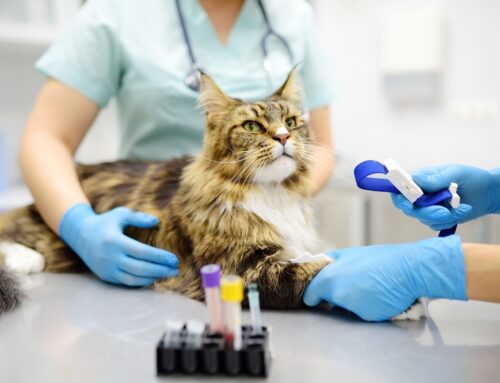Your furry friends are integral members of your family. They keep you company, whether they are resting at your feet during endless Zoom calls or acting as your exercise buddy, ensuring you meet your New Year’s resolution goal.
However, you can easily lose track of time, especially during this pandemic, and forget that your pet needs their regular wellness care veterinary visit. Regular wellness visits are vital to help ensure your four-legged companion remains healthy and by your side into their grey muzzle years. In fact, February is designated Responsible Pet Owners Month to emphasize the importance of routine wellness care. During the physical examination section of your pet’s wellness visit, you may think your veterinarian is simply cuddling your pet and wonder again why a wellness visit is necessary. But, while cuddling is definitely part of your pet’s physical exam, your south Austin veterinarian is sneakily, but carefully, checking your pet from nose to tail. Our Oliver Animal Hospital team explains common physical exam findings and reasons why regular wellness care is important for your pet.
#1: Dental disease in pets
Our veterinarian’s examination of your pet’s teeth is an important component of the wellness care visit. Dental disease is the most common medical condition affecting our four-legged companions, with more than 80% of pets having some form of dental disease by age 3. The first dental disease sign in pets is often bad breath, which may also indicate more severe problems. Pets with periodontal disease have increased amounts of oral bacteria from plaque and tartar buildup on their teeth. The bacteria can travel through their bloodstream and cause organ damage, as well as life-threatening kidney, liver, or heart infections. Therefore, our veterinarian may recommend a professional dental cleaning while your pet is anesthetized, to perform an in-depth examination and thorough cleaning of your pet’s mouth to remove the harmful tartar. This veterinary cleaning, in addition to regular tooth brushing at home for your pet with a pet-safe toothpaste and brush, will be the most effective protocol to stave off dental disease and its potential consequences.
#2: Infectious diseases that can be fatal for pets
Many pet parents dread taking their furry pals to the veterinarian for their shots. However, young pets are especially susceptible to disease and illness, because their immune system is not fully developed. Additionally, senior pets and chronically ill pets are at increased risk of contracting dangerous, sometimes deadly, infectious diseases. Fortunately, vaccinations are available for many common pet illnesses, including parvovirus, distemper, hepatitis, and respiratory illnesses (e.g., bordetella or feline herpes virus). Vaccines are the safest, most effective protection against infectious diseases. During your wellness care visit, your south Austin veterinarian will discuss your pet’s history and lifestyle to determine the best vaccination protocol to ensure their protection.
#3: Obesity—now a pet epidemic
Like humans, weight management and monitoring is a key component of pets’ wellness care. Owners commonly feed tasty treats or extra dinner servings to show their furry pals their love, unaware that their pudgy pooches and fluffy felines are becoming dangerously overweight. In fact, more than 50% percent of U.S. cats and dogs are considered obese or overweight, which can decrease the precious time you have with your pet by more than two years. Additionally, overweight or obese pets have an increased risk for various illnesses, including diabetes, arthritis, kidney, heart, and lung diseases, and some cancers. During your pet’s wellness care visit, your south Austin vet will discuss your pet’s diet and exercise routines. Subtle adjustments, such as increased walk or play time and the appropriate high quality, balanced diet, can vastly improve your pet’s weight and overall health. Managing your pet’s weight is a lifelong endeavor, and regular monitoring and wellness exams will ensure they are on the right track and remain a healthy weight.
#4: Early disease detection in your pet

At your pet’s wellness care visit, your veterinarian will also discuss your pet’s home habits and lifestyle, and changes you may have noticed since their last visit. Subtle changes, such as urinating outside the litter box or a sudden lack of interest in play, could indicate a more serious health issue. Our veterinarian may recommend blood work to evaluate organ health and help identify potential chronic health concerns, such as diabetes or kidney disease. Early detection is vital to ensure successful treatment and long-term health management. Wellness visits present the perfect opportunity for you to discuss any concerns you have and for your veterinarian to catch problems early.
Our Oliver Animal Hospital team wants to ensure your pets remain healthy and by your side for as long as possible. Call our office if you have any questions or concerns about your pet’s health, or to schedule them for a wellness care visit.







Leave A Comment